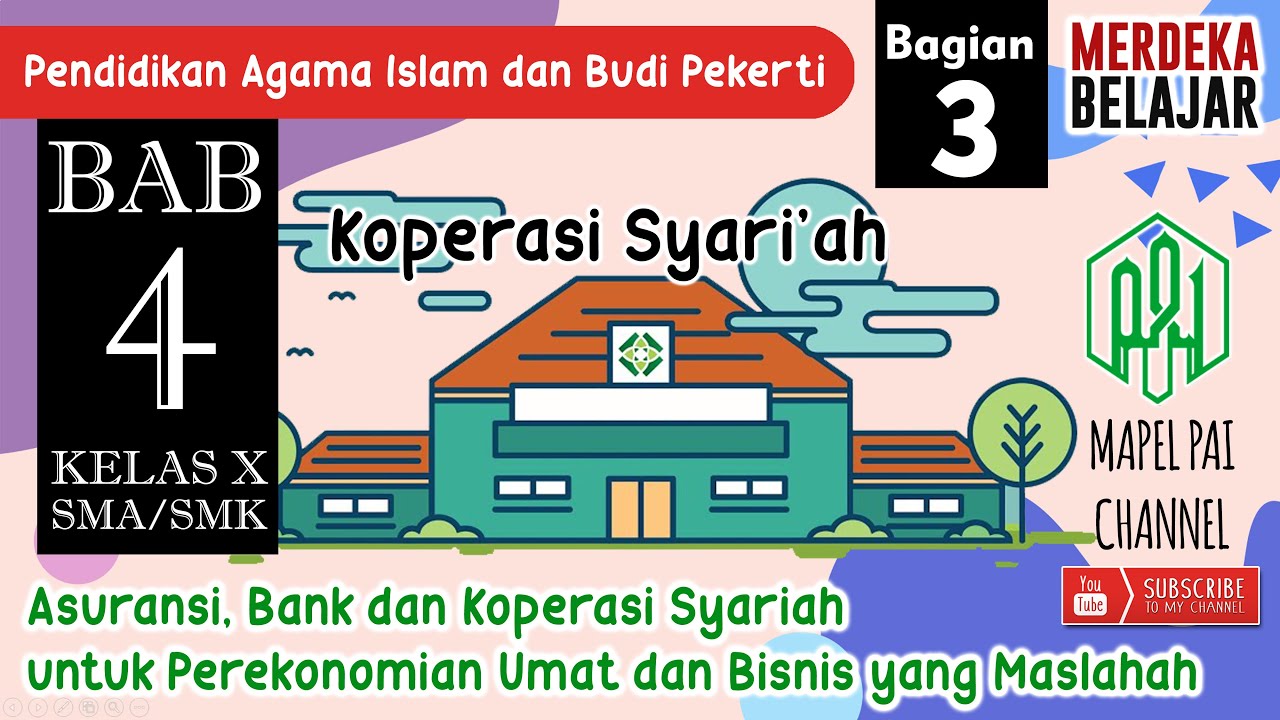KOPERASI (Video Pembelajaran Ekonomi Kelas 10)
Summary
TLDRThis video explores the concept and role of cooperatives in the economy. It explains the definition, principles, and goals of cooperatives, emphasizing their importance in building a fair, democratic, and sustainable economy. The video highlights different types of cooperatives, their functions, and their impact on improving the lives of members. It also addresses the misconceptions about cooperatives being outdated and small-scale, showcasing successful examples of cooperatives thriving in various sectors, from telecommunications to agriculture, proving their relevance in the modern economy.
Takeaways
- 😀 Koperasi is a cooperative organization based on mutual cooperation and solidarity, aimed at benefiting its members.
- 😀 Koperasi is defined by Law No. 25 of 1992 as a business entity with a focus on family values and based on democratic principles.
- 😀 The main goal of koperasi is to contribute to the development of a just and prosperous national economy.
- 😀 There are seven key principles of koperasi, including voluntary membership, democratic management, and fair distribution of profit based on each member's contributions.
- 😀 There are five types of koperasi: savings and loan cooperatives, consumer cooperatives, producer cooperatives, service cooperatives, and marketing cooperatives.
- 😀 Koperasi is divided into primary cooperatives (minimum 20 members) and secondary cooperatives (formed by at least three cooperatives).
- 😀 Koperasi plays a significant role in improving the quality of life for its members and supporting the national economy.
- 😀 The cooperative structure includes three main components: the General Meeting of Members (highest authority), the management team (cooperative operators), and the supervisory team (oversees operations).
- 😀 Koperasi generates funds from both internal sources (savings and reserves) and external sources (loans from members or financial institutions).
- 😀 The remaining profit after operational expenses (sisa hasil usaha) is distributed among members based on their involvement and contributions.
- 😀 Koperasi also contributes to education by providing a platform for students to practice entrepreneurship and developing social responsibility through activities like providing school supplies.
Q & A
What is the definition of a cooperative according to Indonesian law?
-According to Indonesian Law No. 25 of 1992 on Cooperatives, a cooperative is a business entity formed by individuals or legal entities, based on cooperative principles, and serves as a movement for the economic improvement of society, founded on the principle of family values.
What are the main reasons why some people prefer borrowing money from loan sharks instead of cooperatives?
-Some people prefer borrowing from loan sharks due to misconceptions about cooperatives being complicated, outdated, or unknown. They also perceive loan sharks as offering faster access to funds, despite the higher risks involved.
What are the seven principles of cooperatives?
-The seven principles of cooperatives are: voluntary and open membership, democratic management, fair distribution of surplus, limited return on capital, the principle of family solidarity, education and training, and independence.
What are the five types of cooperatives mentioned in the script?
-The five types of cooperatives are: savings and loan cooperatives, consumer cooperatives, producer cooperatives, service cooperatives, and marketing cooperatives.
What is the difference between primary and secondary cooperatives?
-Primary cooperatives are formed by at least 20 people, while secondary cooperatives consist of at least three cooperative entities and have a broader geographical scope.
What role do cooperatives play in national economic development?
-Cooperatives aim to improve the national economic system by fostering a fair and prosperous society. They help build economic independence and strengthen the national economy by ensuring that wealth is shared more equally among members.
How are cooperatives structured in terms of governance?
-Cooperatives are governed by three main structures: the General Assembly, which holds the highest authority; the management team, which runs the operations and is elected by the members; and the supervisory board, which monitors the management's performance.
What are the different sources of cooperative capital?
-Cooperative capital comes from its own members through initial deposits, mandatory savings, reserve funds, and donations, as well as loans from other cooperatives, banks, and other legitimate financial sources.
What is the significance of 'sisa hasil usaha' (surplus income) for cooperatives?
-'Sisa hasil usaha' refers to the income a cooperative generates within a year, which is used to cover operating costs and is distributed among members based on their participation. Part of it is also allocated to the cooperative's reserve fund.
What are some successful examples of cooperatives in Indonesia mentioned in the script?
-Successful examples include Telkomsel's employee cooperative in the telecommunications sector, Koperasi Susu Sapi Pujon in Malang, Koperasi Kredit Yunion Keling Kumang in Kalimantan, and Koperasi Karya Mukti in Sumatra. These cooperatives have thrived in various industries and are key contributors to the local and national economy.
Outlines

هذا القسم متوفر فقط للمشتركين. يرجى الترقية للوصول إلى هذه الميزة.
قم بالترقية الآنMindmap

هذا القسم متوفر فقط للمشتركين. يرجى الترقية للوصول إلى هذه الميزة.
قم بالترقية الآنKeywords

هذا القسم متوفر فقط للمشتركين. يرجى الترقية للوصول إلى هذه الميزة.
قم بالترقية الآنHighlights

هذا القسم متوفر فقط للمشتركين. يرجى الترقية للوصول إلى هذه الميزة.
قم بالترقية الآنTranscripts

هذا القسم متوفر فقط للمشتركين. يرجى الترقية للوصول إلى هذه الميزة.
قم بالترقية الآنتصفح المزيد من مقاطع الفيديو ذات الصلة

BADAN USAHA KOPERASI - BADAN USAHA DALAM PEREKONOMIAN INDONESIA - MATERI EKONOMI KURIKULUM MERDEKA

KOPERASI

Ekonomi Kelas 11 | Badan Usaha dalam Perekonomian di Indonesia

Kurikulum Merdeka : Ekonomi (SMA Kelas XI) || Koperasi

Bab 4 Asuransi, Bank, dan Koperasi Syariah | Bagian Ketiga Koperasi Syari'ah | Kurikulum Merdeka

Materi Pembelajaran Pelatihan Perkoperasian | Regulasi & Kebijakan bagi Koperasi
5.0 / 5 (0 votes)
